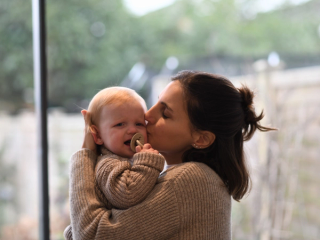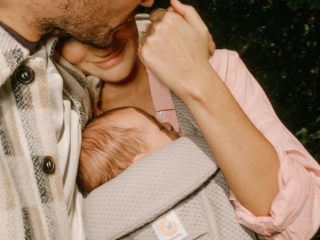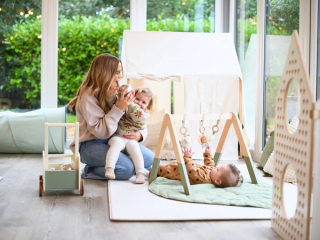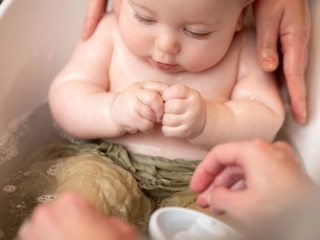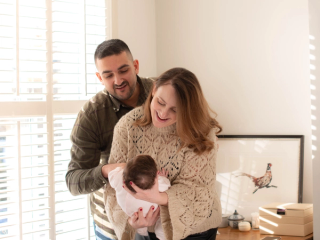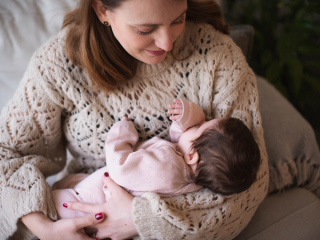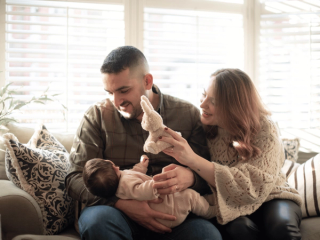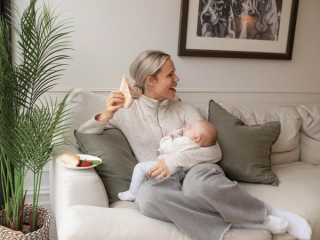
- Home
- Advice Hub
- Newborn
- New Parent Support
- Postnatal Mental Health And Wellbeing
Postnatal mental health and wellbeing
In this article our GP, Dr Sayyada, covers some of the common perinatal mental health conditions, symptoms to be aware of and how to get the appropriate support and help.
The information in this article is for education purposes and should not replace professional medical advice. Always consult medical professionals/your healthcare provider for diagnosis and treatment.
As you navigate through the journey of pregnancy into parenthood, you can expect there to be lots of changes during the perinatal period - the time from pregnancy up until one year after giving birth. Experiencing mental health problems during this time is common, affecting as many as one in five women. In this article I will go through some of the common postnatal and perinatal mental health conditions, symptoms to be aware of and how to get the appropriate support and help.
Remember it's totally normal to experience a range of emotions during pregnancy and after childbirth, but when these feelings are persistent and start impacting your daily life, it might indicate an underlying mental health issue. Sometimes these can be new mental health problems, or reoccurrence of previous conditions. The key is to be able to recognise the symptoms and get early support and treatment.
Postnatal depression (PND)
In the first couple of weeks after giving birth it is common to experience “baby blues” where you can feel tearful, low in mood and anxious. This is usually due to changes in hormones and settles within two weeks. If symptoms last longer than this it can be postnatal depression.
Postnatal depression is common affecting one in ten women within the first year after giving birth, partners can also be affected. Symptoms can include persistent feelings of sadness, low mood, hopelessness, fatigue, difficulties sleeping and changes to your appetite. Risk factors for developing postnatal depression include a previous history of depression, a lack of support after giving birth and a traumatic birth experience.
Mothers can struggle with daily functioning and bonding with the baby, leading to overwhelming emotions and a sense of detachment. Postnatal depression can be treated and with the appropriate care and support most people will make a full recovery.
Postnatal anxiety
Many parents, especially first-time parents, experience worries or fears about their ability to care for their baby or concerns about the baby's health and safety. Worrying as a parent is normal, but when that anxiety becomes overwhelming, impacting your mood, making you feel restless, affecting your day-to-day functioning or sleep, then it’s important to seek support. Speak to loved ones and healthcare professionals; they can provide the right treatment, including coping strategies and reassurance during this challenging time.
Perinatal Obsessive compulsive disorder (OCD)
Perinatal OCD involves unwanted thoughts (obsessions) that lead to repetitive behaviours (compulsions). In the perinatal period these thoughts can often involve the baby's safety or well-being, and lead to compulsive behaviours like excessive checking on the baby or cleaning, often causing distress and interfering with daily life. It can affect one in fifty mothers during pregnancy so getting the right help - which may involve therapy and/or medication - is important to manage the symptoms.
Post traumatic stress disorder (PTSD)
A difficult or traumatic birth experience can emotionally impact both parents. Symptoms of PTSD may include intrusive memories, nightmares, or avoidance of reminders of the birth, and these symptoms can cause significant distress and interfere with bonding with the baby. Speaking to a healthcare professional about your experiences, seeking therapy and utilising support groups specialised in birth trauma can provide support, validation and coping strategies that can aid in the recovery process.
Postpartum psychosis
Postpartum psychosis is a rare but severe mental health illness that requires immediate medical attention. Symptoms can include hallucinations, delusions, and extreme mood changes. It might be difficult to recognise that you are unwell, symptoms may be picked up by family or loved ones. Prompt medical intervention is essential in managing this condition and ensuring the safety of both mother and baby.
Where to go for help and support
The first step is to recognise the symptoms of perinatal mental health. If you are experiencing any symptoms or your partner is or maybe your loved ones feel you need some extra support - know that you are not alone. There are multiple support services and healthcare professionals who will help you through this journey and with the right care and treatment you can make a full recovery.
Healthcare professionals
Speak to a healthcare professional straight away such as your midwife, health visitor, or GP so that they are aware of your symptoms and how you feel. They can provide support and treatments tailored to your needs and can also refer you to a mental health specialist if needed. In emergencies, such as suicidal thoughts or immediate danger, you should call 999 or attend A&E. Urgent support services are also available if you need help with your mental health with both NHS 111 and Samaritansavailable 24/7.
Partner, family and friends
Speak to your partner, a trusted friend or family member about how you feel. They can provide a supportive ear, and can help you to access the right support that you need.
Charities and nonprofits
Further resources and support is available through organisations such as:
- Maternal Mental Health Alliance , PANDAS Foundation and Mind which offer information and guidance for navigating perinatal mental health challenges.
- Association for Post-Natal Illness (APNI) offers friendly advice and support for individuals experiencing postnatal depression.
- Maternal OCD is a charity that provides information and support to those suffering with perinatal OCD.
- Tommy's and The Birth Trauma Association offers support for individuals who have experienced baby loss or had difficult or traumatic pregnancies, births, or postnatal periods.
- Home-Start UK can pair you with a volunteer who can visit you to offer practical and emotional support.
Navigating the complexities of perinatal mental health may seem challenging, but support and resources are available to help you through this journey. Parenthood is a wonderful journey but can also be a challenging time. If you notice that any of your thoughts or feelings are persisting and beginning to impact your daily living, have a low threshold to reach out for support. Prioritise the well-being of yourself and your baby by talking to friends, family, and healthcare professionals to get the support you need.
Advice & tips

Want to read more? Join the HiPP BabyClub for full access to this article.
As a BabyClub member, you'll get access to a range of exclusive benefits, including:
Monthly competitions
Discounts from our Partners
Expert advice tailored to your little one's age
Weaning recipes
HiPP shop discounts*
*10% off HiPP's online shop does not apply to our First Infant, Anti-Reflux or Comfort Formula Milk.
Important notice: Breastfeeding is best. Follow on milk should only be used as part of a mixed diet from 6 months. Talk to a healthcare professional.





